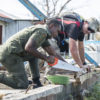War on Peace: The End of Diplomacy and the Decline of American Influence by Ronan Farrow
By Mr J.G. Seabrook
Plenty of book reviews have hailed Ronan Farrow’s War on Peace for drawing attention to the deep need for diplomats, using robust journalistic techniques and profound personal experience inside the United States State Department.[1] Forgivably for civilian writers though, most miss a resounding theme of his book: it is essential reading for military thinkers, soldier-scholars, and anyone wishing to soundly achieve strategic and operational effects. When considering the New Zealand Government’s coordinated approach to the South West Pacific, hard-learnt American lessons could enable a more seamless programme of engagement efforts by the Ministry of Foreign Affairs and Trade and NZDF.
The problem, as highlighted in the book’s title, is the trend in the United States, and arguably across like-minded countries, that countries have relinquished their functional tools for intelligence, surveillance, and reconnaissance (ISR) capabilities and effects achievement beyond a ten-year horizon. The reason? Military officers have seized the initiative so often and so effectively that statesmen now think only in five-to-ten year, military-campaign timelines. Farrow argues consistently that militaries are running roughshod over diplomatic efforts, often to the detriment of both. In failing to enable and support their diplomatic counterparts, American senior officers are largely writing off an essential function in a nation’s security strategy.[2]
The book’s style has opted to draw heavily on personal experience as a means of demonstrating the faltering embrace of diplomacy’s ISR and effects capabilities. Using the venerable Ambassador Robin Raphel as a vehicle, Farrow demonstrates clearly how diplomats fit into a state’s intelligence function, looking out to then 10-100 year period beyond Brigade recon, Div recon, Corps recon, and strategic collection. So effective was Raphel in her information-gathering, she appeared in other collectors’ reporting. Knee-jerk “security-concerns” reactions failed to understand that this was intelligence corroboration at its finest: multiple sources seeing the same thing. From an outside perspective, militaries that don’t enable diplomats, forsake intelligence access they could only dream of developing.
More importantly, the book lays out the argument for the hand-over of targeting and effects from military to diplomatic corps beyond the strategic depth. The inclusion of government intent in orders means tactical commanders are foolish to ignore the target-handover point to diplomats and policy makers. Likewise, strategists would be negligent to ignore their role in the higher plan. Major General Felix Gedney, lately the Deputy Commander of Operation Inherent Resolve, has explained how civil-military integration ought to be working on the ground in Iraq and Syria, employing State Department officials alongside military commanders and intelligence collectors in-theatre to counter the Islamic State of Iraq and the Levant.[3] Evidently, Farrow’s thinking is reflected by the independent judgement of the Five-Eyes’ leading generals.
Admittedly, the author makes no bones about his biases and preference for State-Department work. His passion is convincing. His disdain for a military complex that has made good leaders shrug off responsibility beyond their boundaries is fair. Soldiers pride themselves on how effectively we can make all-of-government approaches work, even with inferior partner agencies, and yet Farrow rightly calls out the arrogance of where this approach has now led plenty of campaigns. Allowing yourself to be objective amidst Farrow’s emotive arguments against the Trump Administration and the military’s enabling of diplomacy’s decline, will permit you to find the kinds of lessons learnt on achieving international effects good leaders pine for.
Farrow managed to interview every living US Secretary of State and was able to draw significantly on his very close relationship with Richard Holbrooke, the single-man diplomatic effect that drew the Bosnian War to a close. This access to Holbrooke, probably accidentally, highlights how essential mission command is to achieving any effect. Holbrooke’s (sometimes unsanctioned) initiative-taking and freedom of action prove how effective the mission-command doctrinal principle can be when untethered in a public service. For all those NZDF personnel who have complained at the slow processes of our partner agencies, Farrow has unintentionally thrown down the gauntlet: how are you as a service member or organisation enabling others and fulfilling government intent?
Collaborative militaries ensure the functionality of mission command across the remainder of a state’s security system. Few Five-Eyes soldiers and officers could argue against employing their well-honed, agile, and adaptive processes (from planning to effects) in support of government direction. Though subtle, Farrow presents a point of view militaries pretend to embrace: that militaries should not make policy, policy-makers should. As Farrow rightly points out, diplomat’s jobs are frustrating, tedious and thankless – sounds familiar.[4]
War On Peace with its eye-catching title should be a go-to for military readers needing a detox from reading on leadership principals and the wars retired generals have already waged. To military eyes it will expand understanding of the military’s place in a state’s broader security system, and how despite plenty of people’s experience over the past decades, diplomats and soldiers are natural allies. In short: read this book. Then give your copy to a diplomat, and discuss how we achieve effects over decades.
[1] D. Kurtz-Phelan, “In His First Book, Ronan Farrow Laments the Decline of Diplomacy,” New York Times, 09 May 2018, available at: https:// www.nytimes.com/2018/05/09/books/review/ronan-farrow-war-on-peace.htm/ accessed 28 November 2019.
[2] Kurtz-Phelan, Farrow Laments.
[3] CJTF-OIR Lessons Learnt Presentation, presented at NZ Army Land Warfare Symposium: Land Operations in the Urban Environment 26 September 2019.
[4] R. Brooks, “Book Review: War on Peace: The End of Diplomacy and the Decline of American Influence, by Ronan Farrow,” The Washington Post, 22 July 2018, available at: https://www.stuff.co.nz/life-style/105525775/book-review-war-on-peace-the-end-of-diplomacy-and-teh-decline-of-american-influence-by-ronan-farrow, (accessed 28 November 2019.)






